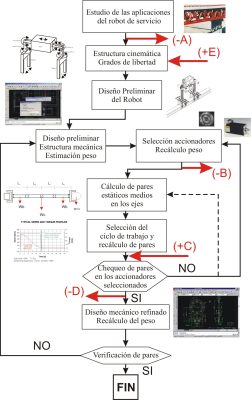Service robots are one of the main priority areas of research in the field of robotics and automatization, such as show the directive lines of 6th EU Framework Programme, and the road maps of the two thematic networks, Euron and Clawar. The application of these robots for service tasks (personal assistance, education, social tasks, etc.) makes that their design will be very important, being crucial several parameters like the weight, the kinematic configuration, the layout of masses, etc. These robots have innovative designs and structures that allow them to move in non structured environments, walking, climbing, etc.The main objective of this project is the development of a system that automates the service robot design process, (non available in the market). The design will be from different points of view: electro-mechanical, control and structural. As a result of the application, the system will optimize several characteristics of the robot: the overall weight, the manoeuvrability, the number of degrees of freedom, the cycle work, etc. The approach of the project is mechatronic, integrating the knowledge of two research teams in one multidisplicinary team, formed by researchers that belongs to the Ingeniería de Sistemas y Automática an Ingeniería Mecánica areas.The SIDEMAR system integrates several design tools with others to develop, making an environment easy to use. Among the used tools are: the design and mechanics CAD synthesis, finite elements design and 3D simulation systems, etc. On the other hand, force calculation at the joints tools, thermal actuator design tools, and refinements mechanics tools will be developed. The integration of these tools will be with an user friendly environment, including the 3D simulation, with the final goal of optimizing the main characteristics of the service robots. For checking the obtained results a testbed will be developed, this testbed involves one degree of freedom robot with multiple sensors.

